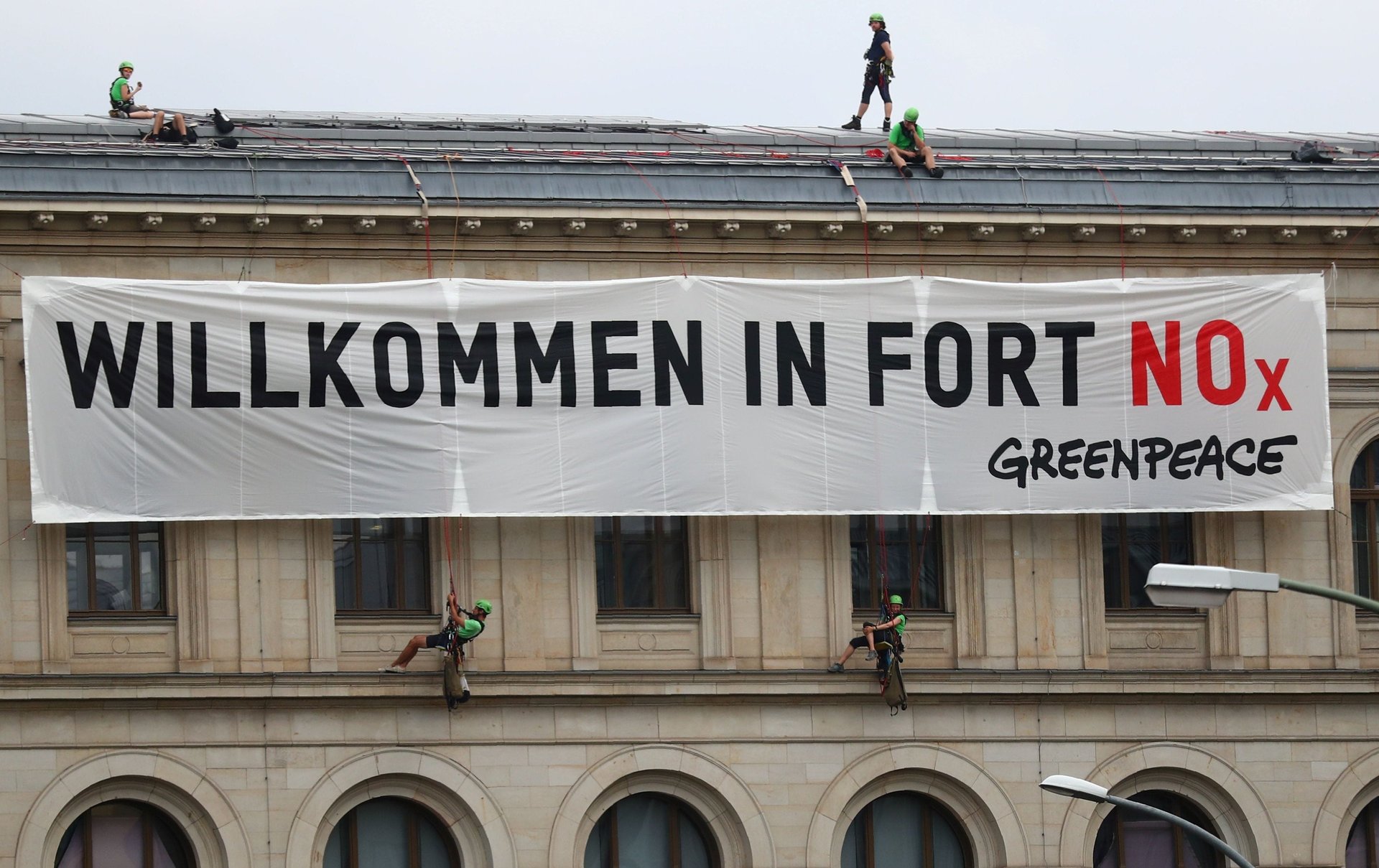Germany’s diesel scandal shines a light on how cozy the government is with carmakers
The emissions cheating scandal that began with Volkswagen in 2015 has now spread to include all the big German automakers. In recent weeks Daimler, VW, Porsche, BMW, and Audi were found to have manipulated nitrogen-oxide emissions from some of their diesel cars and issued mass recalls.


The emissions cheating scandal that began with Volkswagen in 2015 has now spread to include all the big German automakers. In recent weeks Daimler, VW, Porsche, BMW, and Audi were found to have manipulated nitrogen-oxide emissions from some of their diesel cars and issued mass recalls.
With less than two months to go to election day, the government stepped in last week and hastily organized a summit with car chiefs, who were desperate to try and stave off a ban on diesel motors.
The industry bosses came out of the meeting with what many say is a slap on the wrist: They must refit around 5 million diesel cars with new software so they emit less nitrogen oxide, and pay into a public transit fund to reduce diesel pollution. Unintentionally, the summit also had the effect of drawing attention to how close lawmakers in Berlin are to the country’s automakers.
“That hasn’t paid off, as in the end it wasn’t in the interests of the car industry either,” says Stefan Bratzel from the Center of Automotive Management. “They’re looking for ways out because if the share of diesel cars decreases, carmakers will have big problems meeting the CO2 regulations that are set for 2021.”
Bild newspaper reported on Sunday that Lower Saxony state premier Stephan Weil let Volkswagen edit his 2015 speech to the regional parliament addressing the diesel scandal. After vetting by VW, the speech, hailing VW as a “pearl of German industry,” made it sound like the carmaker didn’t manipulate emissions on purpose. Lower Saxony, Germany’s biggest state, has a 20% stake in VW—and Weil sits on its supervisory board.
No representatives from consumer protection or environmental groups were invited to the summit, provoking criticism that the government’s priority was shielding a lucrative industry, rather than holding it to account. “Maybe this relationship has gotten a little too close,” environment minister Barbara Hendricks said, following news last month that the country’s carmakers allegedly ran a price-fixing cartel for years.
Timo Lange of German non-profit organization LobbyControl notes that it is “embarrassing” that the VW scandal was uncovered by American authorities instead of German ones. Indeed, a glance at the number of auto execs who have made the transition to politics, and vice-versa, suggests a well-oiled revolving door. A few examples: Matthias Wissmann, the transport minister when Angela Merkel was environment minister, has been the president of the German Automotive Industry Association since 2007. Eckart von Klaeden was state secretary in the chancellery (part of Angela Merkel’s inner circle after she won power) before becoming head of external relations for Daimler. Thomas Steg was deputy government spokesman for seven years, then joined Volkswagen as its chief lobbyist. Merkel’s campaign manager Joachim Koschnicke used to be Opel’s chief lobbyist.
Germany’s formidable auto industry has boosted the country’s economy, created hundreds of thousands of jobs and transformed the nation into an exporting powerhouse. Thanks in large part to the auto industry, “Made in Germany” has become a byword for quality as well engineering and technological prowess.
In return, automakers could rely on politicians to fight their side when it came to lobbying against pollution regulations in Brussels or subsidizing diesel fuel. German carmakers have made big commitments to diesel engines as a way to ensure they meet tough new EU regulations on carbon-dioxide emissions coming up from 2020—diesels emit less CO2 than petrol engines. But diesels can be bad for people’s health thanks to the smog-making nitrogen oxides they emit. They are also proving harmful for German carmakers’ reputations, as well as the governments that have willingly gone along for the ride.